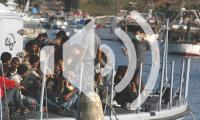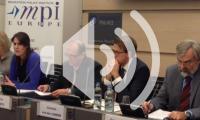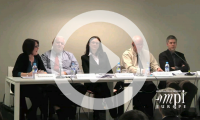
Elizabeth Collett
Global Fellow
Special Adviser for Policy and Strategy to the IOM Director General
Elizabeth Collett is Special Adviser for Policy and Strategy to the Director General of the International Organization for Migration (IOM). Previously, she was Founding Director of MPI Europe in Brussels and was Senior Advisor to MPI's Transatlantic Council on Migration.
She has more than 20 years of experience in the migration policy sector, and has produced dozens of working papers, policy briefs, and memos focused on the future of European Union immigration and asylum policy, as well as national-level migration policy developments. She has consulted for numerous government ministries and nongovernmental organizations, including foundations, nonprofits, and UN agencies.
Prior to joining MPI, Ms. Collett was a Senior Policy Analyst at the European Policy Centre, a Brussels-based think tank, and was responsible for its migration program, which covered all aspects of European migration and integration policy. She has also worked in IOM's Migration Research and Policy Department in Geneva and for the Institute for the Study of International Migration in Washington, DC. She also served as a Research Associate at the Centre for Migration Policy and Society, Oxford University (2011-13).
She is a member of the Advisory Board of the Migration Policy Centre at the European University Institute and the Strategic Council of the European Policy Centre.
Ms. Collett holds a master's degree in foreign service (with distinction) from Georgetown University, where she specialized in foreign policy and earned a certificate in refugee and humanitarian studies, and a bachelor's degree in law from Oxford University.
Bio Page Tabs
This MPI Europe telebriefing, releasing the brief "Strengthening Refugee Protection and Meeting Challenges: The European Union’s Next Steps on Asylum," examines Europe's current reality with respect to migration and asylum and assesses the possibilities for future development of EU immigration policy.
This Migration Policy Institute Europe event, organized with the Bertelsmann Stiftung, entitled Effective Labour Migration Management: Creating Checks and Balances while Searching for Talent brought together experts, policymakers, and social partners involved in the management of labor migration to discuss the various options available to policymakers.
This event marks MPI Europe's official launch in Brussels. To inaugurate the new office, MPI Europe will host a panel discussion to explore what is driving societal discontent in Europe, the role immigration plays in this, and why there is a growing perception that immigrant integration efforts are failing.
Pages
Recent Activity
A discussion on the extraordinary boom in investor immigration, including the rapidly expanding EB-5 visa in the United States, Malta’s controversial “cash for citizenship” policy and a host of programs across Europe and the Caribbean.
In the coming weeks, the President-Elect of the European Commission and leaders of the European Union will discuss the new institutional map of the European Union, including new portfolios for the incoming college of Commissioners. Despite the fact that immigration is a critical challenge for the European Union, it has become harder for EU institutions to forge a strong policy. Perhaps as a result of this disconnect, one of the key ideas on the table is to create a Commissioner for Migration.







Europe Pushes to Outsource Asylum, Again
Turkey-Style Deals Will Not Solve the Next EU Migration Crisis
Borderline Irrelevant: Why Reforming the Dublin Regulation Misses the Point
A Game of Chess, Not Tennis: Unraveling the Rights and Status of “Brexpats”
New EU Partnerships in North Africa: Potential to Backfire?
The Paradox of the EU-Turkey Refugee Deal
The Asylum Crisis in Europe: Designed Dysfunction
The EU’s Strategic Guidelines on Migration: Uncontentious Consensus, But Missed Opportunity
An EU Commissioner for Migration? The Devil is in the Details
Valuing Citizenship: A Commodity or an Identity?